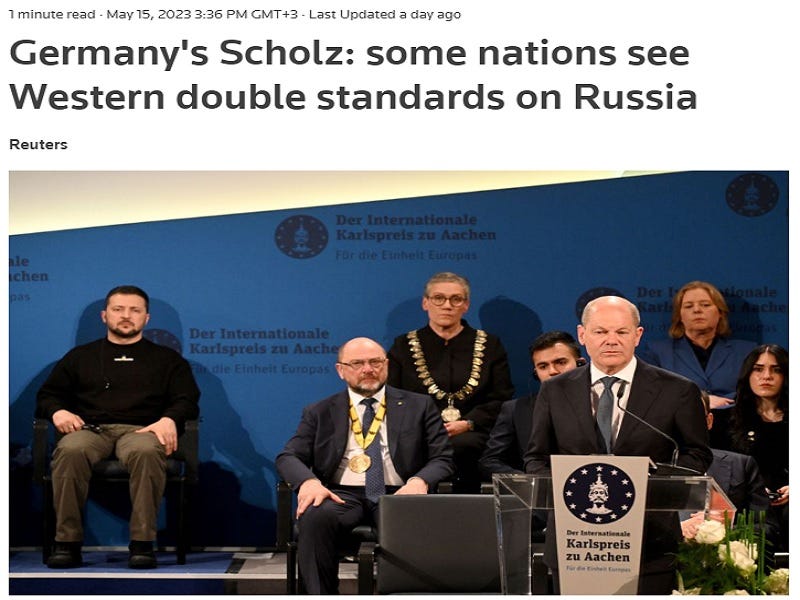There’s no going back to the status quo ante bellum when the West thought it had a fighting chance at coercing the Global South into doing its bidding, and the sooner that it treats them as true equals, the better.
German Chancellor Olaf Scholz admitted on Monday that the Global South’s perception of Western double standards greatly impeded his de facto New Cold War bloc’s efforts to get them to dump Russia. Nevertheless, he’s still clinging to the chance that they’ll eventually reconsider if the West changes its ways such as by giving them greater representation in global fora like the UNSC and G20. Scholz doesn’t realize that the ship has sailed on getting the Global South to do this and is thus making a fool of himself.
The West’s maximum pressure campaign failed to coerce the Global South to sanction Russia even among those states that voted in support of hostile resolutions against it at the UNGA. Many of them were arguably inspired by fellow developing country India’s principled neutrality towards the NATO-Russian proxy war, which showed that they can indeed multi-align between the US-led West’s Golden Billion and the Sino-Russo Entente if they have the political will and diplomatic deftness to do so.
To be sure, most Global South states were already disinclined to support the West due to their resentment over being treated so unfairly by it over the decades, but India proved that it’s possible to defy their pressure without any serious consequences so long as they truly balance between everyone. Their subsequent refusal to comply with that de facto New Cold War bloc’s zero-sum demands to unilaterally concede on their objective national interests represented a turning point in global affairs.
Even former Director for Europe and Russia at the US National Security Council Fiona Hill acknowledged in her latest opinion piece on Monday about “Ukraine in the new global disorder” that this conflict is “a proxy for a rebellion by Russia and the ‘Rest’ against the United States. The war in Ukraine is perhaps the event that makes the passing of pax Americana apparent to everyone.” She added that “’swing states’—the so-called ‘Rest’ of the world—seek to cut the U.S. down to a different size in their neighborhoods”.
This insight aligns with the assessment shared by Goldman Sachs’ President of Global Affairs Jared Cohen on the same day in his article about “The rise of geopolitical swing states”. While it’s possible that these two independently arrived at the same conclusions on the same day as Scholz’s limited hangout admitting that Western double standards discredited his side’s efforts to get the Global South to dump Russia, the case can be made that this is actually a coordinated attempt to change the official narrative.
It’s now impossible for any Westerner to deny that their de facto New Cold War bloc’s maximum pressure campaign failed in all respects if they want any chance of retaining even a semblance of credibility in the Global South. This is especially so after the New York Times literally admitted this a quarter of a year ago back in February in two articles regarding the West’s lack of success in crippling the Russian economy via sanctions and isolating it via diplomacy that were analyzed here and here.
Those pieces and other related ones that different outlets published since then served to precondition the public for Monday’s triply whammy of Cohen, Hill, and Scholz all acknowledging the Global South’s strategic autonomy in the New Cold War. It’s no small matter either that these three influential folks all said practically the same thing at the same time since it shows that the West has finally recognized the reality that its influence is a shadow of its former self when compared to the past three decades.
That said, all three still remain under the influence of wishful thinking to various extents when it comes to the viability of restoring their side’s lost influence over the Global South. Scholz is the most delusional in this respect since he thinks that they can basically be bought off by being given permanent representation at global fora like the UNSC and G20. Cohen and Hill, on the other hand, are comparatively more realistic and urge the West to more fairly engage with the Global South on all issues.
They’re still naïve in implying that the West can roll back those countries’ strategic autonomy or at the very least navigate this new normal of International Relations in ways that advance their side’s interests at the Sino-Russo Entente’s expense, but it’s better than refusing to recognize how much has changed. As was mentioned in the introduction, the ship has sailed on getting the Global South to dump Russia, and it’s been gone long before that when it comes to getting them to dump China.
The past 15 months saw this collection of countries unprecedentedly flex their strategic autonomy in the New Cold War after being inspired by India’s successful practice of principled neutrality towards the NATO-Russian proxy war, which enabled Delhi to adroitly multi-align between all key players. There’s no going back to the status quo ante bellum when the West thought it had a fighting chance at coercing the Global South into doing its bidding, and the sooner that it treats them as true equals, the better.




